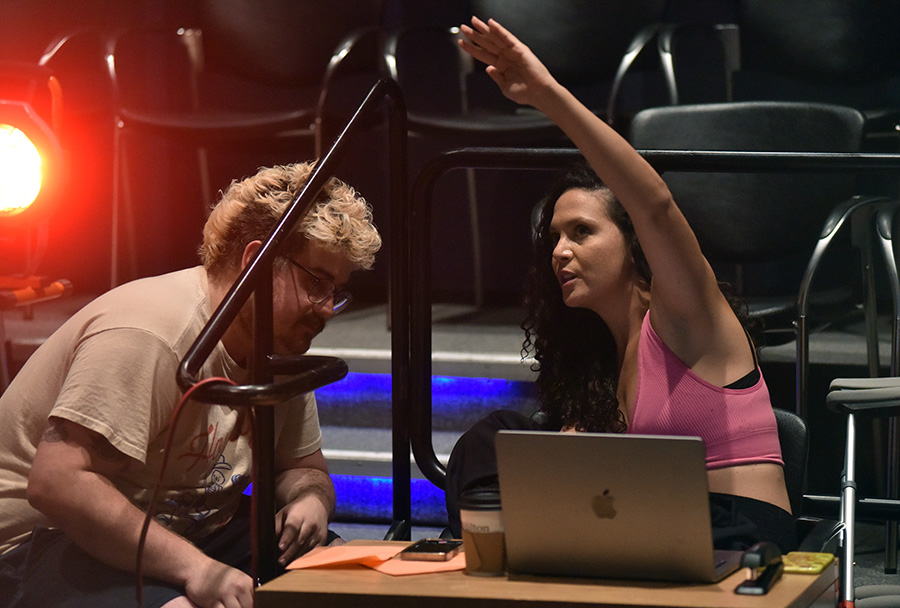School of Drama
The ColLABo Project
A One-of-a-Kind Laboratory for Theater Makers
written by
Gretchen Suárez-Peña
Rivka Rivera made rice rain in the Rauh.
It’s an alliteration that tickles the tongue and sparks an image if you’re familiar with the black box theater inside the Purnell Center for the Arts, home of Carnegie Mellon University’s School of Drama. Yes, this past summer, buckets of raw rice fell from the grid ceiling of the Rauh theater, an idea born from scenic designer Michael Ruiz-del-Vizo. The falling grain was used to mimic the sound, look, feel and symbolic intensity of a hurricane in a new play, “The Mourners,” written by CMU alum, playwright Rivka Rivera, as part of the inaugural ColLABo project.
ColLABo is a new production development incubator hosted on CMU’s campus during the summer break, and the brainchild of School of Drama Senior Associate Head and Associate Professor of Acting, Kyle Haden.
“ColLABo is a director and designer-led incubator for projects that are in the stop between reading and production. We’re especially interested in developing new stories centering marginalized voices.”
Kyle Haden
Senior Associate Head, School of Drama
Associate Professor of Acting, School of Drama
Haden and Rivera both agree that in the world of new play development, often the only opportunities are residencies, readings, workshops, or the big, time-crunched, high-stakes production. There is no time to really think through the technical elements that make a play theatrical, when a product is always needed at the end: a script, a performance, a show. ColLABo fills a hole in the American theatrical landscape. It gives playwrights the opportunity to work with directors and designers, as well as orchestrate the moments integral to the story that require specific design elements. In the case of “The Mourners,” that moment is when Hurricane Maria strikes Puerto Rico.
“The Mourners” is about a multi-generational family on the eve of Hurricane Maria in 2017. This family is dealing with the loss of their daughter, mother and ex-partner. For Rivera, this piece comes from a real and personal place having lost her sister and experiencing the pain of seeing family deal with the aftermath of Maria both in and outside of the island.
Rivera is a self-identified “Jew-Yo-Rican”: half-Jewish, half-Puerto Rican, and born and raised in New York. Known as Rebecca during her time at CMU (BFA Acting, 2010), Rivera performed in such shows as “The Mill on the Floss,” “Richard the Third,” “One Flea Spare,” and “A Boy Named Alice,” the last written by Joshua Harmon (MFA Dramatic Writing, 2010). But, she says, it was after leaving school that she began to dig into her Jewish and Puerto Rican heritage.
“The industry really wants to put you in a box — what are you?”
Rivka Rivera
“I started saying ‘yes’ to Latin roles and felt a deep shift to further explore and expand my identity … the name Rivka came to me, and I changed my name without asking anyone’s permission,” Rivera said. Rivka is Hebrew for Rebecca. So being Rivka Rivera, “I was Jewish and Puerto Rican and could marry those two parts of myself.” Rivera will not be put in a box! She says that CMU gave her the tools to explore her identity and helped her not only expand her career in acting for the stage, tv and film, but also in writing, facilitating workshops and even hosting a podcast.
Rivera felt that bringing “The Mourners” to CMU was incredibly serendipitous. As a high schooler, she attended a theater camp one summer at the Oregon Shakespeare Festival, where both Haden and Juan Rivera Lebron — School of Drama alum, and now visiting professor, who also worked “The Mourners” during ColLABo — were instructing at the time. Haden was excited to have a CMU alum as part of the inaugural ColLABo. Rivera says that returning to CMU was incredibly healing; a full circle moment where she was able to work on this show centered around grief and deconstruct the notion of what it means to develop a play to its full potential.
Oh, and what potential! Rivera says that the best things about ColLABo were the resources it offered, time being the most valuable. CMU provided props, space, a stipend and even technical personnel, including Tate Abdullah, a third-year MFA Sound Design student. “We worked with Tate, who blew our minds about how we think about sound,” said Rivera.
“We worked on building tension by creating these natural sounds with props within the space. The sounds began with the actors and then those sounds emanated outward. We even did some foley work with flutes. It was all very organic. It was awesome to be part of something so new and experimental,” said Abdullah of the ColLABo experience.

Putting the show up on its feet in this collaborative fashion gave Rivera the confidence to revise her script in specific and deliberate ways. That collaboration was built by a team comprised of director Francisco Rivera Rodriguez, scenic designer Michael Ruiz-del-Vizo, and producer Lana Russell, with actors Juan Rivera Lebron, Sam Marzella (BFA Music Theater, 2023), Bryanna Felipe (BFA Acting, 2023) and Moire Del Carmen Díaz (MFA Costume Production, 2024).
Rivera says that finding these moments in space, with technical pieces in place, made it very clear what story was being told and how it should be told moving forward.
“We can now go to interested producers and say, ‘Yes, this hurricane works with rice and fans and these props and these sounds, and this is how the actors work together on stage with all these elements because we’ve done it. It’s not theoretical, we’ve seen it in action.’”
Rivka Rivera
This was Haden’s goal all along, to help secure the technical aspects of a piece before going into costly productions. He recalled an experience that threw in design elements during rehearsals and how jarring it was. “If this had been done with designers a week before actors showed up, it would have been easier and safer for everyone to understand how working in this space changes how we navigate it and tell the story.” It seems like an ounce of ColLABo is worth a pound of cure, given it can cut technical issues down the line by addressing them early.
“We forget that theater is a collaborative art. As an actor, sometimes it feels like you’re just passing through gates of the playwright, director, costumer, etc.” says Rivera. She goes on to explain that working together in real space and in real time can help artists form that cohesive bond, which in turn affects the telling of the story. Rivera feels confident that after this experience her piece is more ready than it has ever been for production and hopes that other places with similar resources will replicate the model. “I didn’t need another residency or reading. I needed this experience to show me what was tangible for this show.”
ColLABo 2024 will take place May 27 – June 10.
